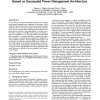Free Online Productivity Tools
i2Speak
i2Symbol
i2OCR
iTex2Img
iWeb2Print
iWeb2Shot
i2Type
iPdf2Split
iPdf2Merge
i2Bopomofo
i2Arabic
i2Style
i2Image
i2PDF
iLatex2Rtf
Sci2ools
165
click to vote
DAC
2003
ACM
2003
ACM
Scalable modeling and optimization of mode transitions based on decoupled power management architecture
To save energy, many power management policies rely on issuing mode-change commands to the components of the system. Efforts to date have focused on how these policies interact with the external workload. However, the energy savings are ultimately limited by the set of power-saving modes available to the power manager. This paper exposes new power-saving opportunities to existing systemlevel power managers by handling each desired mode change in terms of an optimal sequence of mode transitions involving multiple components. We employ algorithms to optimize these transition sequences in polynomial time, making them applicable to static and dynamic policies. The decoupling between policies and mechanisms also makes this approach modular and scalable to devices with complex modes and intricate dependencies on other devices in the system. Experimental results show significant energy savings due to these sequentialized mode-change opportunities that would otherwise be difficult to discover...
| Added | 13 Nov 2009 |
| Updated | 13 Nov 2009 |
| Type | Conference |
| Year | 2003 |
| Where | DAC |
| Authors | Dexin Li, Qiang Xie, Pai H. Chou |
Comments (0)

